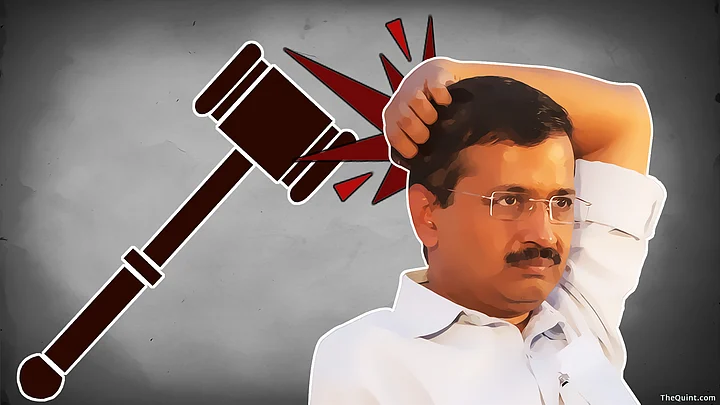In the ongoing, two-year tussle between the Aam Aadmi Party’s Delhi government and the BJP-led Centre, the Delhi High Court judgement on a batch of writ petitions seeking clarity on the role of the lieutenant governor has tilted the balance in favour of the Union government.
The Delhi High Court, in a batch of petitions filed by the AAP government against the Centre, and petitioners challenging decisions of the Delhi government, has held, among other things, that the Arvind Kejriwal’s council of ministers cannot take any decisions without the approval of the lieutenant governor. Its decision is based on an interpretation of clause (4) of Article 239AA of the Constitution which prescribes that the council of ministers have to give the L-G aid and advice, but where the L-G disagrees with the minister, the L-G is entitled to refer the matter to the President for a decision.
Establishing L-G’s Superiority
In effect, the Delhi High Court has firmly and categorically re-asserted Delhi’s status as a “Union Territory” for constitutional purposes – one that is ruled essentially by the administrator (in this case, the lieutenant governor) who is an appointee and agent of the Centre. Unlike the governor of a state, who is largely a symbolic figurehead except in some situations (as the Supreme Court recently reiterated), the L-G, according to the Delhi High Court, has the final say in all executive functions of the Delhi government.
On its own terms, this interpretation is not untenable. It is entirely plausible on a plain reading of Article 239AA. Other Union Territories, after all, are governed similarly and Article 239AA, according to the high court, does not in any way take away from the powers of the lieutenant governor. The high court also contrasts the lieutenant governor’s position under the Constitution to that of the governor who has to act solely on the aid and advice of the council of ministers in a state.
Merely because the interpretation is tenable, is it necessarily the right one? I don’t think so.
Mini Monarchy in Delhi
The high court’s interpretation, carried to its logical conclusion, creates a mini-monarchy – it implies that the lieutenant governor is the one who is the true ruler of Delhi while the chief minister, council of ministers and the legislative assembly merely advise him in the exercise of his powers and the laws that should be passed.
In effect, the National Capital Territory of Delhi is ruled like an erstwhile princely state, such as Mysore or Travancore which also had representative assemblies that exercised no real power. Given that the LG is appointed by the Union government as well, he is, to use a colonial analogy, both the ruler of the state and also the resident appointed by the government as its agent.
What the high court has perhaps lost sight of, and failed to take into account, is that the Union Territories in India are all not governed alike. There are, in fact, two broad kinds – Union Territories without a legislative assembly (e.g. Andaman and Nicobar Islands and Lakshadweep) and Union Territories with legislative assemblies (Puducherry and Delhi).
Who Rules Delhi?
- Delhi High Court, in its recent order has established the supremacy of
the Lieutenant Governor over the Chief Minister.
- A literal interpretation of the court’s order gives a sense that Delhi is a monarchy with CM and his council of ministers supposed to
advise the L-G.
- The high court order fails to address the fact that Delhi
is different from other union territories as far as the existence of an elected assembly
is concerned.
- HC’s order has resulted in a situation where L-G’s authority seems to be overarching.
- Hopefully, the Supreme Court will reverse the decision.
Is Delhi Different from other UTs?
Even Delhi and Puducherry are not exactly alike – while Puducherry’s legislative assembly has only so many powers and functions as the Parliament allows it to have, the Delhi assembly’s powers to pass laws are directly traceable to the Constitution.
Under the Constitution, all of Puducherry’s assembly members need not be elected at all, whereas constitutionally, all of Delhi’s are to be elected by the city’s voters. While it may not be a state in the strict sense, of all the Union Territories, Delhi is not a Union Territory ruled directly by the Union either.
Supremacy of State Assembly
What the high court’s interpretation does not take into account is that the restrictions placed on the powers of the Delhi council of ministers and assembly are by way of exception, keeping Delhi’s position as a national capital in mind. On the contrary, it makes the exception the rule by ignoring the purposes for which the Constitution vests an elected assembly and government for Delhi.
Ultimately though, the high court’s interpretation goes against the grain of the basic features of our Constitution: parliamentary democracy. The Westminster model of government enshrined in our Constitution was the result of a slow and steady accrual of power in the hands of the elected representatives of the people from an absolute monarch. The high court’s interpretation reverses this trend, concentrating all the power in the hands of the L-G and the final say in decision making.
One hopes that in appeal the Supreme Court sees the implications of the Delhi High Court’s judgement and interprets Article 239AA differently to restore the democratic supremacy of the assembly.
(The writer is a Senior Resident Fellow at Vidhi Centre for Legal Policy. He can be reached at @alokpi)
Also read:
Elections a ‘Tamasha’ If L-G Has All Power, Writes AAP’s Ashutosh
After Delhi HC Order on Jung Issue, AAP Must Focus on Governance
